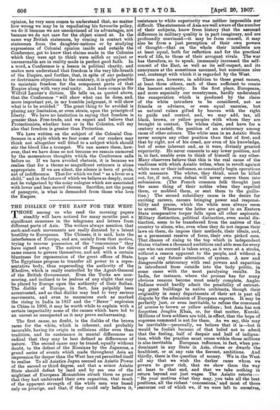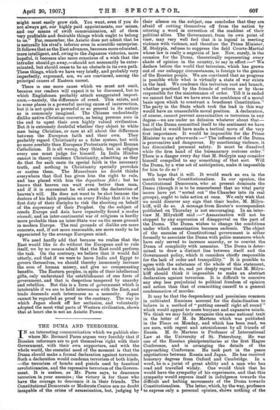THE DISLIKE OF THE EAST FOR THE WEST.
THOSE among us who read the morning papers _L steadily will have noticed for many months past a significant sameness in the telegrams and letters from different parts of Asia. The writers always mention that such-and-such movements are really dictated by a latent hostility to Europeans. The Chinese, it is said, hate the interference of Europe, and are, mainly from that motive, trying to 'recover possession of the " concessions " they have signed away. The natives of Bengal wish for the same reason to govern themselves, and ask with a certain bluntness for repossession of the great offices of State. The Egyptians propose to transfer all power to a repre- sentative body, thus superseding the authority of the Khedive, which is really controlled by the Agent-General of the British Government. Even the Turks are mur- muring, and inclined to be jealous of any slight that may be placed by Europe upon the authority of their Sultan. The dislike of Europe, in fact, has palpably been accentuated, and as that dislike may lead to very serious movements, and even to massacres such as marked the rising in India in 1857 and the " Boxer " explosion in China in 1900, it may be worth while to explain with a certain impartiality some of the causes which have led to an unrest as unexpected as it may prove embarrassing.
The first cause, no doubt, is the dislike of the brown races for the white, which is inherent, and probably incurable, having its origin in collisions older even than tradition, and its sustenance in mental differences so radical that they may be bast defined as differences of nature. The second cause may be traced, equally without doubt, to the defeat of the Russians by the Japanese, a grand series of events which made throughout Asia an impression far deeper than the West has yet permitted itself to realise. To all Asiatics Japan seemed an Asiatic Power of the second or third degree, and that a minor Asiatic State should defeat by land and by sea one of the mightiest of European Monarchies struck them as proof that they had underrated their own capacities, that much of the apparent strength of the white men was based only on prestige, and that, if they could only believe it,
resistance to white superiority was neither impossible nor difficult. The statesmen of Asia are well aware of the number of their subjects, know from history that the assuMed difference in military quality is in part imaginary, and are profoundly convinced—it may be from conceit, it may also be from a just perception of their own powers of thought—that on the whole their intellects are at least equal, both for reflection ami for the practical work of life, to those of their arrogant rivale. The war has therefore, so to speak, immensely increased the self- conceit of the East, as well as its self-respeet, and its annoyance at the sometimes assumed, but sometimes also real, contempt with which it is regarded by the West.
There are, however, in addition to these great causes, at least three others, each of them sufficient 'to create the keenest animosity. In the first place, Europeans,' and more especially our countrymen, hardly understand the exasperation which is produced by the claim of the white intruders to be considered, not as friends or advisers, or even equal enemies, but. as natural rulers gifted by heaven with the right to guide and control, and, we may add, tax, all black, brown, or yellow peoples with whom they are brought in contact. The whites claim, and have for a. century exacted, the position of an aristocracy among races of other colours. The white man in an Asiatic State never accepts any other position than that of first, and that by right, not of his creed, nor even of his knowledge, but of some inherent and,. as it were, divinely granted superiority. Ile never consents to any lower position, and is, in fact, unable even to think of himself in any other. Many observers believe that this is the real cause of the readiness with which Asiatic tribes, when in revolt against white men or their influence, so constantly begin operations with massacre. The whites, they think, must be killed out, for, if not, even defeat will never coerce them into submission. (The French common folk thought just the same thing of their nobles when they expelled, them, or mobbed them, or sent them to the guillo- tine.) The second subsidiary cause is the desire for exciting careers, careers bringing power and responsi- bility and praise, which the white men always seem to arrest. Whenever the latter are %great in an Eastern State comparative torpor falls upon all other aspirants. Military distinction, political distinction, even social din- tinction, seem to be transferred from the natives of the _ country to aliens, who, even when they do not impose their laws on them, do impose their methods, their ideals, and, as a permanent reserve of force, their own picked men. That chance of rising to the top which in independent States vitalises a thousand ambitious and able men for every one who can succeed is taken away, as it were at a stroke, without a reason apparent to the people, and without a, hope of any future alteration of system. A new and disagreeable aristocracy with real powers and capacities is introduced from outside into the body politic, in some cases with the most paralysing results. India, for instance, where the process has for many obvious reasons become most nearly complete, Anglo- Indians would hardly admit the possibility of entrust; in great buildings to native architects, though their originality in' many departments of their art is past all dispute by the admission of European experts. It may he just, ust, or even inevitable, to refuse the command of armies to brown or yellow soldiers ; but Aida has not forgotten Jenghis Khan, or, for that matter, Kuroli. Millions of born soldiers are told, in effect, that the hope of supreme command is not for them. As we say, this may be inevitable—personally, we believe that it is—but it would be foolish because of that belief not to admit that the feeling, half of despair and half of indigna- tion, which the practice must rouse within those millions is also inevitable. European influence, in fact, when pre- dominant in any State in Asia, closes or dwarfs the healthiest, or at any rats the fiercest, ambitions. And thirdly, there is the question of money. We in the West all say that we wish the darker races whom we govern to grow rich, that we show them the way at least to that end, and that we take nothing in return beyond our just wages. The Asiatic retorts :- "Be Be your motives what they may, you take all the best positions, all the richest concessions, and most of those resources out of which we, if we were left to ourselvea, •
might meet easily grow rich. You want, even if you do not always get, our highly paid appointments, our mines, Mid Mg means of swift communieation, all of them very profitable and desirable things which ought to belong to us." For, remember, the Asiatic does not admit that he is naturally his rival's inferior even in scientific enterprise. It follows that as the East advances, becomes more educated, more intelligent, and, owing to the Japanese victories, more hopeful, it beoomes also more conscious of a wish that the intruder should go away,—should not necessarily be exter- minated, Nit should cease to be an obstacle in its own path. These things, which we have very briefly, and probably very imperfectly, expressed, are, we are convinced, among the principal causes of Eastern unrest.
There is one more cause which we must not omit, because our readers will expect it to be discussed, but to which Englishmen probably attach exaggerated import- ance,—namely, the difference of creed. This exists, and in some plates is a powerful moving cause of insurrection, but it is not quite so powerful or so general in its nature as is commonly imagined. The Chinese undoubtedly dislike native Christian converts, as being persons sure in the end to upset their own highly valued civilisation. But it is extremely doubtful whether they object to white men being Christian, or care at all about the difference between the European faith and their own. They probably regard Christianity as a false system, but with no more acerbity than European Protestants regard Roman Catholicism. It is all wrong, they think, but in religion every one must judge for himself. In India Hindus cannot in theory condemn Christianity, admitting as they do that for each caste its special faith is the necessary truth, and nothing in Christianity specially provokes or excites them. The Mussulnia,n no doubt thinks everywhere that God has given him the right to rule, and has placed with him the depositum fidei ; but he knows that heaven can wait even better than man, and if it is convenient he will await the declaration of heaven's will. He does not want to be shot because the doctors of his faith proclaim on every Friday that it is the first duty of their disciples to risk the shooting on behalf of the supremacy of their Prophet. On the subject of creeds Europe and Asia have repeatedly found a niodus viveadi, and an inter-continental war of religions is hardly more probable than an inter-State war on the same ground in modern Europe. The real grounds of dislike are more concrete, and, if not more reasonable, are more easily to be appreciated by the average European mind.
We need hardly add that because we realise that the East would like to do without the European and to rule itself, we by no means admit that the East could perform the task. On the contrary, we believe that it would fail utterly, and that if we were to leave India and Egypt to govern themselves, we should thereby immensely increase the sum of human misery, and give no compensating benefits. The Eastern peoples, in spite of their intellectual gifts, only understand the establishment of one form of government, and that is despotism tempered by anarchy and rebellion. But this is a form of government which is intolerable if we are to hold intercourse with the East, and trade demands such intercourse as a necessity. Japan cannot be regarded as proof to the contrary. The way in which Japan shook off her seclusion, and voluntarily adopted the most vital parts of Western civilisation, shows that at heart she is not an Asiatic Power.











































 Previous page
Previous page